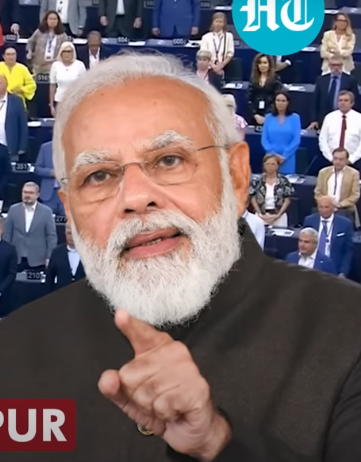The European Parliament on Thursday passed a strongly worded resolution on Manipur urging the Indian government to “put in place all necessary measures to promptly halt the ethnic and religious violence and to protect all religious minorities” in the Eastern Indian State.
Responding to media queries on the development, Indian Ministry of External Affairs Spokesperson Arindam Bagchi said that “such interference in India’s internal affairs is unacceptable, and reflects a colonial mindset”.
The EU Parliament, comprising 705 directly-elected representatives from all member nations, noted: “that intolerance towards minority communities has contributed to the current violence.”
The EU resolution noted that the violent clashes in the state of Manipur since May 3, 2023, have left at least 120 people dead, 50 000 displaced and over 1 700 houses and 250 churches destroyed.
The resolution said that it strongly urges the Indian authorities to put in place all necessary measures to promptly halt the ethnic and religious violence and to protect all religious minorities.
“There have been concerns about politically motivated, divisive policies that promoted Hindu majoritarianism in the area,” it said.
It also refers to the increased distrust in the authorities because of the internet shut down that has “severely hindered reporting by the media, while security forces have been implicated in the recent killings.”
EU MPs called upon the Indian authorities to “allow independent investigations into the violence, to tackle impunity and to lift the internet ban.”
It urged all to stop making inflammatory statements, to re-establish trust and play an impartial role to mediate tensions.”
The resolution condemned the use of the Armed Forces Special Powers Act (AFSPA) which allows arrest without a warrant and indefinite detention.
The Parliament demanded that human rights be integrated into all areas of the EU-India partnership including trade. and has urged all members to “raise human rights concerns notably on freedom of expression, religion and the shrinking space for civil society, with the Indian side at the highest level.”
The EU Parliament resolution came on the heels of Prime Minister Narendra Modi’s arrival in France as the chief guest for Bastille Day. The unanimous view of the EU Parliament was designed to put pressure on the French government and President Emmanuel Macron to raise the issue with PM Modi, and do so publicly.
But given the huge defence deals Macron is going to make with India, such pressure is considered unlikely. However, since the resolution expects all member nations to integrate human rights with all aspects of the relationship with India, France could touch upon the rights issues on another occasion.
India had tried to persuade European Union parliamentarians to reconsider their decision to submit resolutions for a discussion on Manipur was confirmed by foreign secretary Vinay Mohan Kwatra.
“The Manipur question is a matter totally internal to India…. We have made a reach out to the concerned EU parliamentarians. We have made it very clear to them this is a matter totally and absolutely internal to India,” Kwatra said.
He, however, sidestepped a question on whether India had engaged the political lobbying agency Alber & Geiger to persuade the members of the European Parliament (MEPs) to reconsider their resolutions, which are to be followed by a vote.
Six resolutions, across the political spectrum, had been listed for discussion on Wednesday evening under the head “India, the Manipur situation”.
The ECR (European Conservatives and Reformists) Group resolution stated that “religious freedom in India has declined in recent years, marked by the promotion and enforcement of discriminatory laws and practices that negatively impact the country’s minorities of Christian, Muslim, Sikh, and Adivasis populations”.
While the Centre-Right European People’s Party resolution dwelt on the attacks on the Christian community in Manipur, the liberal Renew group’s resolution also draws attention to “concerns about politically motivated divisive policies that promote Hindu majoritarianism and an increase in militant groups”.
The Socialists & Democrats’ resolution mentioned “concerns over shrinking space for civil society, detentions and harassment of those exercising their legitimate rights and the use of laws to stifle dissent”.
It stated that human rights groups have accused the “BJP-led government in Manipur and nationally of implementing divisive ethno-nationalistic policies which oppress in particular religious minorities” and “denounces in the strongest terms nationalistic rhetoric deployed by leading members of the BJP”.
The Verts/ALE (Greens/ European Free Alliance) Group resolution quoted human rights groups accusing the BJP-ruled state government of “stoking ethnic divisions”, “deplores the democratic and human rights backsliding across the country under the leadership of Prime minister Modi” and “reiterates its concern about the stifling of fundamental freedoms, notably under the Foreign Contribution Regulation Act (FCRA) and the Unlawful Activities Prevention Act (UAPA)”.
The Left Group’s resolution said the “Indian government escalated its systematic discrimination and stigmatisation on religious and national minorities, particularly Muslims”, and “political leaders and public authorities explicitly advocated hatred towards these minorities with impunity”.
It also urged the authorities to end its crackdowns on civil society groups and politically motivated prosecutions and harassment on human rights activists and critics under the FCRA, UAPA, and other laws that have been used to intimidate or censor civil society”.
The European Parliament’s resolutions are not binding on member states but act as recommendations and send a message to governments across Europe that parties from the entire political spectrum are supportive of this process.
In 2020, India managed to get a vote on a joint resolution on the Citizenship Amendment Act postponed on the plea that the matter was sub-judice and Indian ministers ought to be given an opportunity to explain it since the India-EU Summit was around the corner. Eventually, with the onset of the pandemic, India dodged the bullet in that instance.





